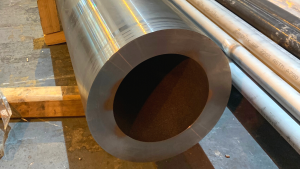Forged pipe is one of the key products on our shelves in our warehouses and the process of forging is where their journey begins.
Pipes are the mainstay of our business here at Special Piping Materials, which means we know everything about how they are made and what they are used for. Forging is a fascinating process that takes engineering and mechanical skill meaning we only work with the best manufacturers of forged pipe in Europe and beyond.
Forging itself is the process of applying immense compressive thermal and mechanical energy to steel billets which results in the shape of the material being changed. When forging products out of exotic steel (like duplex and super duplex) a series of different compression forces are required, each under extremely high pressure. Many factors have to be taken into consideration, such as surface porosity, finer grain structure, higher tensile strength, fatigue life/strength and ductility.
The result of all these processes is forged pipe – a product that is essential to many of the industries we supply to around the globe, such as desalination, oil and gas, nuclear and petrochemical.
As well as pipe, the forging process can be used to manufacture fittings and flanges such as: tees, crosses, outlets, unions, caps, couplings, plugs, nipples, weld neck flange, blind flange, slip on flange, lap joint flange, threaded flange, socket weld flange, plate flange, spectacle blind flanges and many more.
In this blog we’ll cover the basics of how forged pipe is made, and the advantages of using this type of pipe.
How is forged pipe made?
Forging in general can take place in one of two ways – either hot forging or cold forging. Forged pipe out of exotic steel is manufactured through hot forging.
Hot forging is when steel billets are compressed under enormous pressure at an extremely high temperature. The billet needs to be heated before it can start to be changed in shape. There are three different types of hot forging: open die forging, closed die forging and roll forging.
- – Open die forging: Open die forging, which is sometimes known as ‘free forging’, is a type of hot forging that sees a metal being shaped through the use of a mould. This type of forging is often used when large metal parts in very simple shapes are being created.
- – Closed die forging: Closed die forging is used to create small components and is known to create products with good strength and toughness.
- – Extrusion forging: Extrusion forging is what is used to forge pipe. The process sees a heated billet of steel placed inside a die. Pressure is applied in the form of a hydraulic ram that forces the billet against a piercing mandrel. This action results in the heated material ‘flowing’ from the cylindrical cavity in between the die and mandrel parts of the machine, and thus a pipe shape is formed.
Cold forging is a type of forging process that takes place under room temperature. This kind of forging isn’t typically used for forged pipe, but is used for smaller precision parts, like bolts and nut, gears, etc. It works by deforming a metal while it is below its recrystallization point.
Cold forging is also best used to forge soft metal like aluminium, and it is generally a less expensive process than hot forging. Cold forged products typically don’t require any finishing work although they are often heat tested to strengthen them – a process called ‘tempering’.
Advantages of using forged pipe
The many advantages of forged pipe mean that it has a number of different applications in a diverse range of sectors such as oil, gas, hydraulic machinery, fertilisation and chemical. The fact that forged steel has no seam or welding point allows it to successfully contain potentially harmful or corrosive substances and their fumes. Therefore, it can be used in many heavy industries.
- – Strength: Forging pipe usually results in a strong and very reliable end-product because forging causes the grain flows of the steel to alter and align. In other words, the steel becomes more refined and the pipe’s structure is changed unequivocally resulting in sheer strength and high impact resistance.
- – Longevity: Forging excludes the potential for porosity, shrinkage, cavities and cold pour issues.
- – Economical: It is generally accepted that the process of forging is very economical as no material is wasted.
- – Flexibility: The steel forging process is very flexible and can produce many different pipes of varying sizes.
#SpecialPipingMaterials #RenewableEnergy #Renewables #ExoticPipe #StainlessSteel #Piping #Pipe #quality #qualitycontrol #energy
